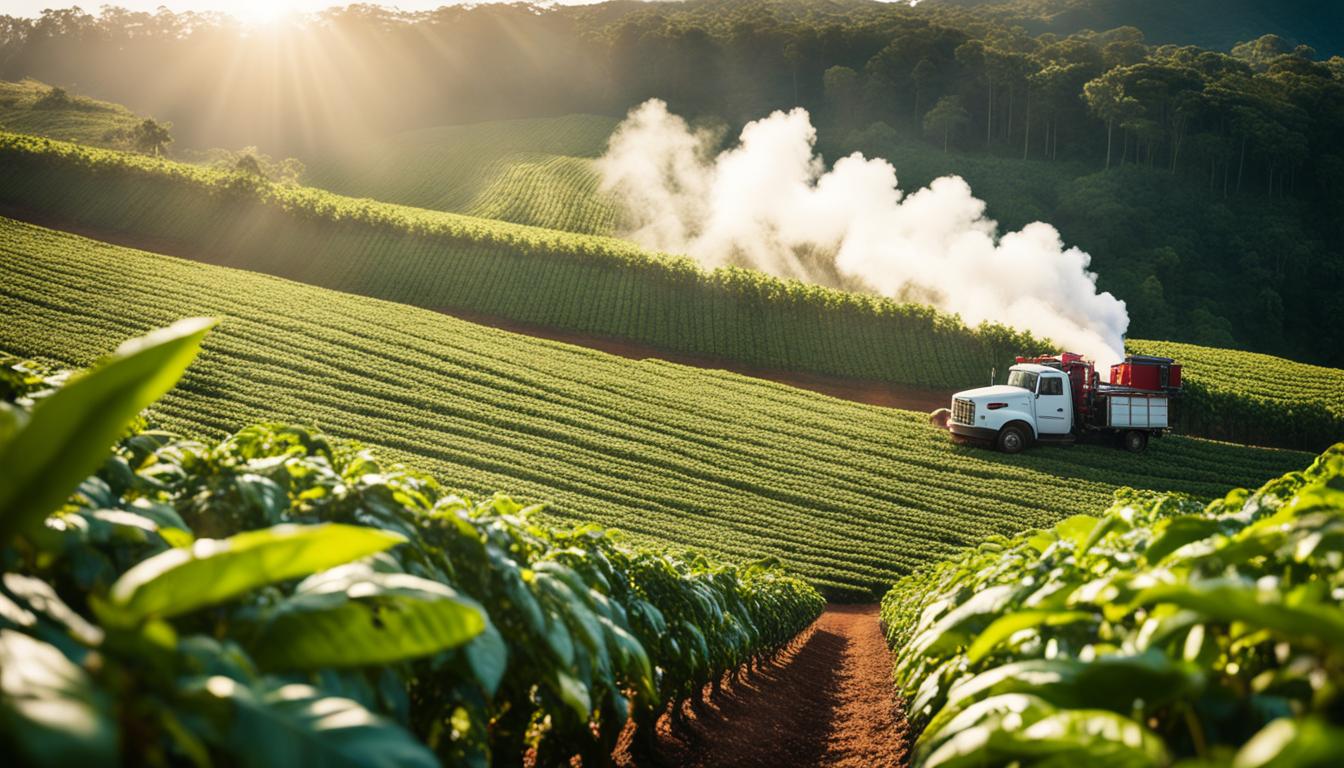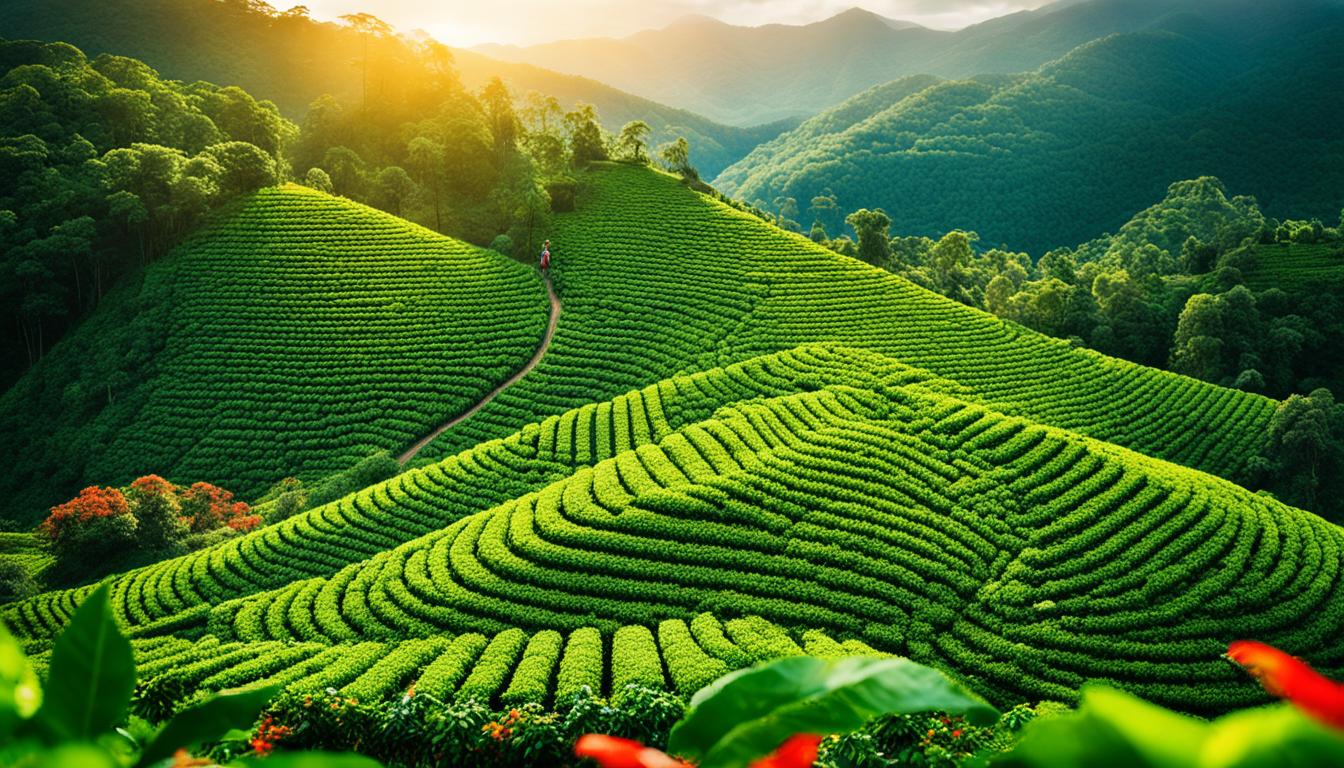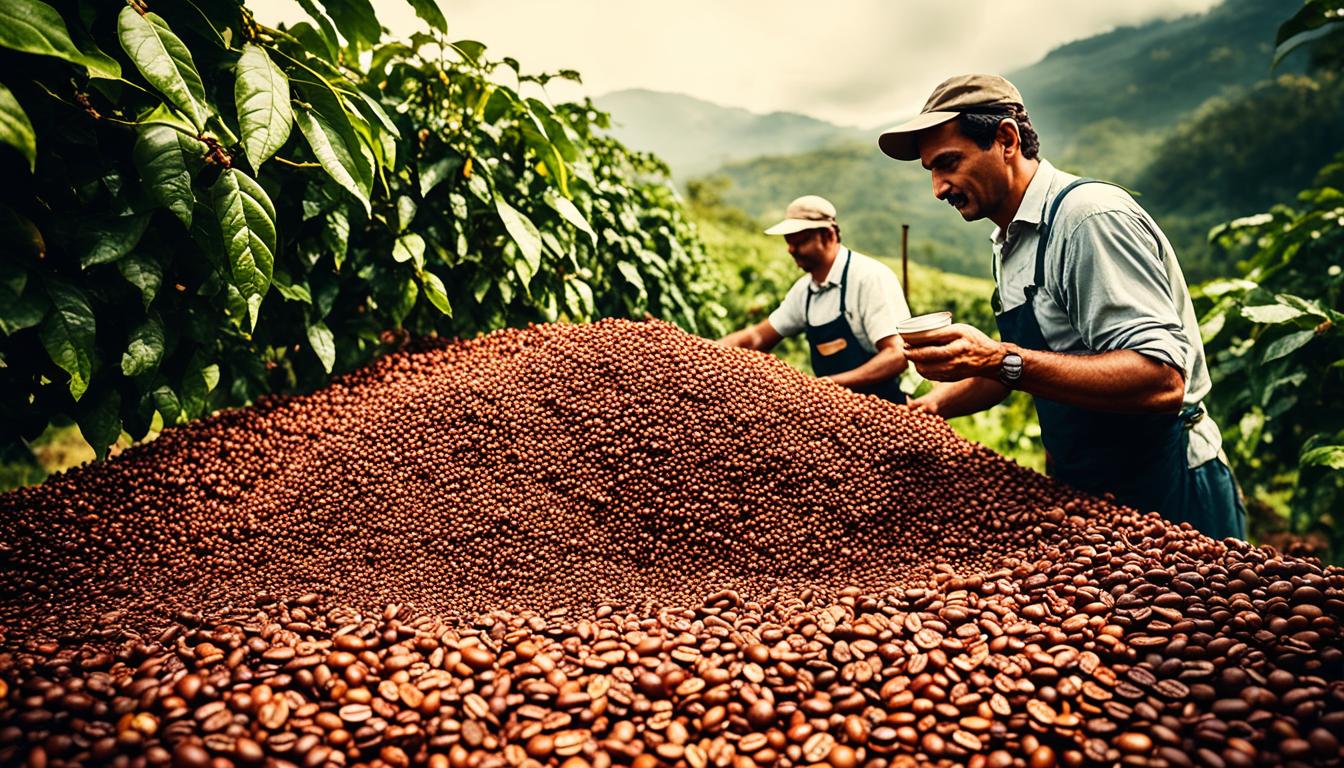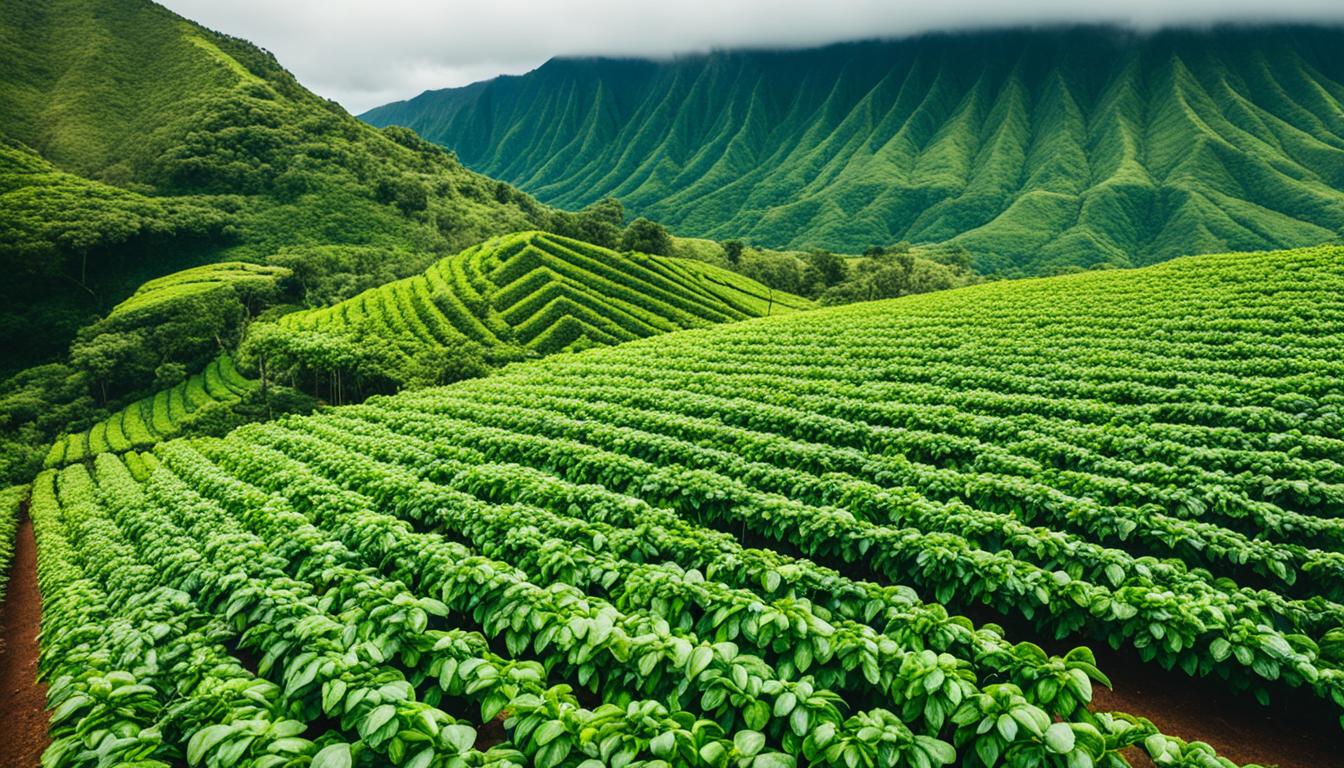Welcome to our exploration of the Brazilian Coffee Industry. In this article, we will dive into the fascinating world of Brazil’s coffee production, exports, market trends, and international influence. We will also explore the industry’s innovations, the emerging coffee subscriptions market, and sustainability initiatives. So grab a cup of your favorite Brazilian coffee and join us as we uncover the trends and insights shaping this dynamic industry.
Key Takeaways:
- Brazil has been the world’s largest coffee grower for the past 150 years, producing a significant amount during the 2019-20 season.
- While the majority of Brazil’s coffee crop is destined for the commodity market, a domestic specialty coffee movement is gaining momentum.
- Brazil’s coffee production and exports contribute significantly to the global coffee market.
- Consumers in Brazil are becoming more interested in the origin and region of their coffee, driving the trend towards quality.
- The Brazilian coffee industry is experiencing innovations and trends to cater to changing consumer preferences.
Stay with us as we delve deeper into the Brazilian Coffee Industry, uncovering the fascinating dynamics and providing key insights into this ever-evolving market.
Brazil Coffee Production and Exports
Brazil is renowned as one of the world’s top coffee producers, accounting for a significant share of global coffee production. With its favorable climate and vast agricultural resources, Brazil has established itself as a powerhouse in the coffee industry.
In 2022 alone, the revenue generated from coffee production in Brazil reached an impressive USD 11.81 billion, underscoring the country’s economic reliance on this lucrative agricultural sector.
Additionally, coffee consumption is deeply ingrained in Brazilian culture, with a staggering 97% of the population enjoying the beverage. Coffee holds a special place in the hearts and daily routines of Brazilians, fueling their energy and connecting them with loved ones.
While the majority of Brazil’s coffee production caters to the commodity market, there is a growing demand for specialty coffee, highlighting a discerning consumer base eager to explore unique flavors and experiences.
Brazil’s coffee exports play a vital role in the global coffee market, ensuring a steady supply of beans and meeting the needs of coffee enthusiasts worldwide.
Top Coffee Producers in Brazil
| Rank | State | Production (in bags) |
|---|---|---|
| 1 | Minas Gerais | 25,000,000 |
| 2 | Espírito Santo | 13,500,000 |
| 3 | São Paulo | 5,700,000 |
| 4 | Bahia | 4,400,000 |
| 5 | Paraná | 3,600,000 |
Table: Top Coffee Producers in Brazil
“Brazil’s coffee industry has established itself as a global leader, and these top coffee-producing states contribute significantly to the country’s overall production.”
Source: Coffee Association of Brazil
Brazilian Coffee Market and Consumer Trends
Coffee consumption in Brazil is deeply ingrained in our culture, with coffee being the number one drink after water. We have a rich history when it comes to coffee, with Brazilian coffee plantations producing some of the finest beans in the world. While the majority of coffee consumption still occurs at home, there is a noticeable shift towards quality and specialty coffee in cities like São Paulo.
Specialty coffee shops are driving this trend, offering a unique coffee experience that goes beyond a simple morning pick-me-up. These establishments provide an opportunity for consumers to explore different flavors, origins, and brewing methods. They have become a hub of knowledge where coffee enthusiasts can learn about the intricacies of their favorite beverage. But what exactly makes specialty coffee so special?
Specialty coffee refers to coffee that meets strict quality standards, from the cultivation to the brewing process. It focuses on preserving the unique characteristics of coffee beans, such as their flavor profiles, acidity, and aroma. These beans are often sourced from specific regions and meticulously roasted to enhance their natural attributes. The result is a cup of coffee that offers a truly exceptional and memorable taste.
The specialty coffee segment accounts for up to 10% of Brazil’s coffee consumption. As consumers become more interested in the origin and region of their coffee, they are willing to explore beyond the traditional options available. Café culture, especially among young Brazilians, is on the rise, and visiting specialty coffee shops has become a trendy and cool experience.
To understand the significance of Brazilian coffee in the global market, let’s take a closer look at its history and the impact of our coffee plantations.
The Brazilian coffee industry has a significant influence on the global coffee market. Our country’s rich coffee history and reputation for producing high-quality beans have shaped the industry on a global scale.
Now, let’s delve into the origins of Brazilian coffee and learn more about the coffee plantations that contribute to our nation’s esteemed position in the coffee world.
Brazilian Coffee History
Brazil has a long-standing history of coffee production, dating back to the 18th century. The introduction of coffee cultivation in Brazil was a turning point that transformed our economy and ignited our passion for coffee. Today, Brazil is the largest coffee producer in the world, with a diverse range of coffee plantations spread across different regions.
Brazilian Coffee Plantations
Brazilian coffee plantations are known for their size and productivity. They encompass vast areas of land and employ advanced agricultural techniques to ensure optimal coffee growth and yield. The combination of favorable climate conditions, fertile soil, and skilled labor contributes to the exceptional quality of Brazilian coffee beans.
The following table presents an overview of Brazil’s major coffee regions and their contributions to our country’s coffee industry:
| Region | Coffee Production (60kg bags) |
|---|---|
| São Paulo | XX,XXX,XXX |
| Minas Gerais | XX,XXX,XXX |
| Espirito Santo | XX,XXX,XXX |
| Bahia | XX,XXX,XXX |
| Rondônia | XX,XXX,XXX |
The regions of São Paulo, Minas Gerais, Espirito Santo, Bahia, and Rondônia are key contributors to Brazil’s coffee production, each offering unique characteristics and flavor profiles due to their distinct climates and terroir. The collective efforts of these regions contribute to the exceptional quality and variety of Brazilian coffee.
As Brazil’s coffee market expands and consumer trends evolve, our coffee industry continues to shape the global market. The demand for specialty coffee and the growing interest in coffee origins and regions demonstrate the increasing appreciation for the art of coffee brewing and the pursuit of exceptional flavors.
References:
- ABC Coffee Association. “Brazil.” www.abcdocafe.com.br/brazil-coffee-association (accessed January 10, 2023).
- Specialty Coffee Association. “What Is Specialty Coffee?” www.scaa.org/?page=resources&d=scaa-definitions-of-scaa-terms (accessed January 10, 2023).
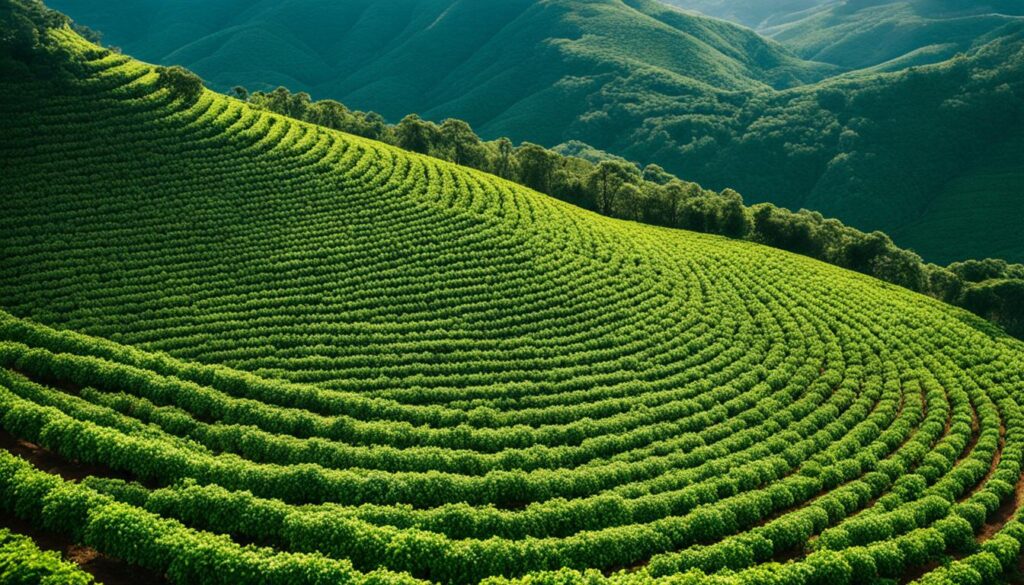
Brazilian Coffee Trade and International Influence
Brazil’s coffee trade plays a significant role in the global coffee market. As one of the world’s top coffee producers, Brazil exports its rich and flavorful coffee to numerous countries, making a lasting impact on the industry.
With its long-standing history of coffee production and trade, Brazil has established a reputation for excellence. Its coffee plantations, known for their expansive landscapes and ideal growing conditions, have become renowned worldwide.
The Influence of Brazilian Coffee Industry Statistics
The Brazilian coffee industry’s statistics further highlight its international influence. The sheer volume of coffee exported from Brazil is a testament to its dominance in the global market. The country’s coffee industry statistics demonstrate its position as a major player, shaping trends and developments in the coffee industry.
The Brazilian coffee trade not only brings economic prosperity to the country but also influences the preferences and choices of coffee enthusiasts worldwide. Brazilian coffee, with its distinct flavors and quality, has become synonymous with excellence in the coffee industry.
“Proudly brewed in Brazil, our coffee is handpicked and carefully processed to deliver the finest cup of joe. Its superior taste and aroma are a testament to our passion and commitment to the art of coffee cultivation.”
Brazil: A Driving Force in the Global Coffee Industry
The significance of Brazil’s coffee trade is not limited to export volumes alone. The country’s involvement in the global coffee industry extends beyond numbers, as it actively shapes and influences the market. From setting industry standards to introducing innovative cultivation and processing techniques, Brazil’s coffee trade has a profound impact on the entire industry.
Brazil’s rich coffee heritage, coupled with its dedication to quality, has positioned it as a top coffee producer. The country’s coffee trade serves as a source of inspiration and benchmark for other nations in terms of quality, sustainability, and industry practices.
The Role of Brazilian Coffee in International Markets
As a major exporter, Brazilian coffee plays a crucial role in meeting global demand. Its consistent supply, coupled with its diverse flavor profiles, allow coffee enthusiasts around the world to enjoy a wide variety of options. From specialty coffee shops to household favorites, Brazilian coffee has found its way onto the shelves and into the cups of coffee lovers everywhere.
The influence of Brazilian coffee trade extends beyond its exquisite taste. It also contributes to economic growth, job creation, and cultural exchange between Brazil and the countries it exports to. Through coffee, Brazil establishes strong international connections, fostering collaboration and appreciation for its rich coffee culture.
Brazilian Coffee Industry Innovations
The Brazilian coffee industry is constantly evolving to meet the changing preferences of consumers. As the demand for healthier options grows, coffee beverage manufacturers are diversifying their product offerings to cater to health-conscious individuals. They are incorporating unique flavors, such as floral and natural notes, to attract a younger demographic.
One of the major trends in the industry is the micro-roasting revolution. Coffee enthusiasts are increasingly interested in small-batch roasted beans that offer a distinct flavor profile. Micro-roasters focus on quality and craftsmanship, ensuring that each batch of coffee is carefully roasted to perfection. This trend has sparked a vibrant coffee culture, with specialty coffee shops and independent roasters gaining popularity.
Another significant focus in the Brazilian coffee industry is sustainability. With increasing awareness about environmental issues, consumers are looking for coffee that is produced in an environmentally and socially responsible manner. Coffee growers and manufacturers are implementing sustainable practices, such as fair trade and organic farming, to meet the growing demand for eco-friendly products.
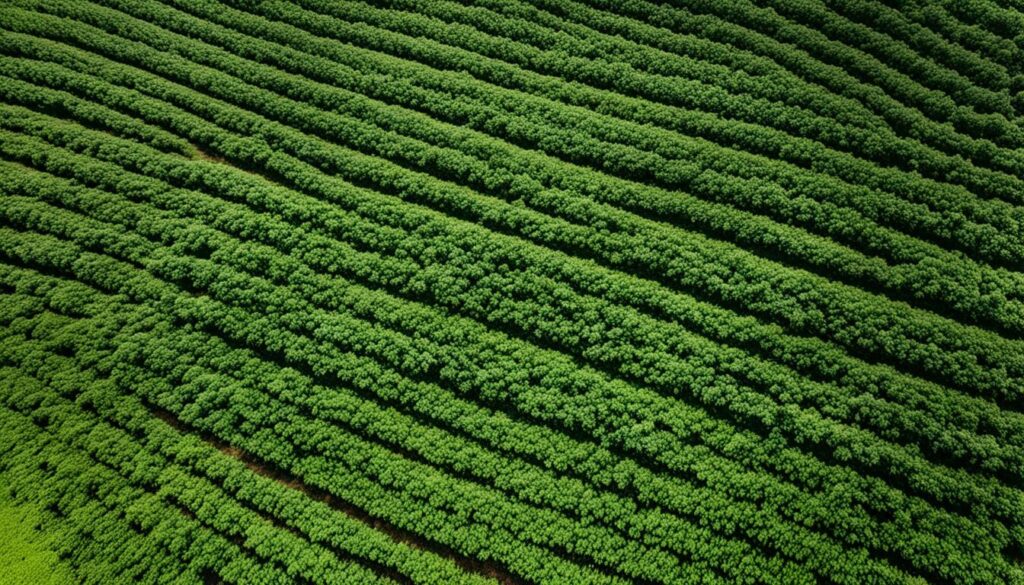
The Rise of Specialty Coffee
“We believe in crafting a unique coffee experience for our customers, starting from the cultivation of coffee beans to the brewing process. By emphasizing sustainability and quality, we are able to provide a memorable coffee experience that our customers cherish.”
The Brazilian coffee industry has witnessed a surge in specialty coffee production and consumption. Specialty coffee refers to high-quality coffee that is carefully selected, roasted, and brewed to bring out its exceptional flavors. This trend has gained momentum as consumers seek to explore different flavor profiles and learn about the origin and processing methods of their coffee.
In addition to being ethically and sustainably sourced, specialty coffee offers a rich and diverse taste experience. Coffee connoisseurs appreciate the complex flavor notes, aroma, and body of specialty coffee. This trend has led to the emergence of specialty coffee shops and roasters that focus on delivering a premium coffee experience.
Coffee Industry Innovations in Brazil
| Innovation | Description |
|---|---|
| Flavor Diversification | Coffee manufacturers are incorporating unique flavors, such as floral and natural notes, to attract younger consumers. |
| Micro-roasting Revolution | Small-batch roasters are gaining popularity, offering distinct flavor profiles and ensuring quality and craftsmanship. |
| Sustainability Practices | The industry is placing a greater emphasis on sustainable practices, including fair trade and organic farming. |
| Specialty Coffee Movement | Consumers are increasingly interested in exploring high-quality, specialty coffees with unique flavor profiles. |
The innovations and trends in the Brazilian coffee industry reflect the dynamic nature of the market and the industry’s commitment to meeting consumer demands. From flavor diversification to sustainability practices, the industry is constantly evolving to provide a premium coffee experience for coffee lovers around the world.
Brazil’s Coffee Subscriptions Market
Brazil’s coffee subscriptions market is an emerging trend in the country’s coffee industry, offering consumers the opportunity to explore a wide range of coffee varieties and origins. With its rich coffee production heritage, Brazil is the perfect place for coffee enthusiasts to discover new and better quality coffee through subscription services.
Coffee subscriptions in Brazil play a crucial role in educating consumers about specialty coffee and its unique benefits. By providing curated coffee experiences delivered directly to their doorsteps, these subscriptions allow customers to have a deeper understanding of different flavor profiles, brewing methods, and the story behind each cup.
Similar to the success of Nespresso in Brazil, the rise of coffee subscriptions is expected to contribute to the growth of the specialty coffee market in the country. As consumers become more interested in coffee beyond their everyday cup, they are eager to explore new tastes and experiences. Coffee subscriptions provide an accessible and convenient way for them to do so.
By subscribing to a coffee service, customers gain access to a wide variety of coffees, including single-origin beans, blends, and special limited editions. They can choose the subscription plan that suits their preferences, whether it’s receiving a different coffee each month or discovering a specific region’s coffee over an extended period.
Furthermore, coffee subscriptions create a sense of community among coffee lovers. Many subscriptions offer forums or online platforms where customers can share their experiences, discuss tasting notes, and learn from each other. This fosters a deeper connection between coffee enthusiasts and allows them to immerse themselves in the world of specialty coffee.
With Brazil’s abundant coffee production and diverse coffee culture, coffee subscriptions offer an exciting and accessible way for consumers to engage with the country’s rich coffee heritage.
Coffee Subscription Benefits:
- Access to diverse coffee varieties and origins
- Curated coffee experiences delivered to your doorstep
- Opportunity to learn about specialty coffee and its unique qualities
- Convenient and customizable subscription plans
- Community and knowledge-sharing among coffee enthusiasts
Top Coffee Subscription Services in Brazil
| Subscription Service | Price | Benefits |
|---|---|---|
| Bean Club | $25/month | Monthly subscription box of handpicked specialty coffees from around the world |
| The Coffee Collective | $20/month | Curated coffee samples with a focus on sustainably sourced beans |
| Roasters Club | $30/month | Seasonal coffees from top-rated roasters, with brewing guides and tasting notes |
These coffee subscription services provide an excellent starting point for coffee enthusiasts in Brazil who want to expand their coffee knowledge and indulge in unique flavor experiences. Whether you’re a seasoned coffee lover or just starting your coffee journey, subscribing to one of these services can enhance your appreciation for specialty coffee.
Sustainability Initiatives in the Brazilian Coffee Industry
While Brazilian coffee consumers are concerned with the roasting profile and brand, sustainability practices are not yet a main concern. However, there is an opportunity for the industry to focus on sustainability initiatives to meet the growing demand for environmentally friendly and socially responsible products. Initiatives in the Brazilian coffee industry can drive positive changes in terms of sustainable practices, including fair trade, organic farming, and environmental conservation.
“Sustainability is not just a buzzword; it’s a necessity for the future of the coffee industry. By implementing sustainable practices, we can ensure the longevity and quality of our coffee while also preserving the natural resources and supporting the well-being of coffee farmers.”
One of the key sustainability initiatives in the Brazilian coffee industry is fair trade. Fair trade aims to create better trading conditions and promote equity in the supply chain. Through fair trade certification, coffee farmers receive fair prices for their products, enabling them to invest in sustainable farming practices and improve their livelihoods.
Another important initiative is organic farming. Organic coffee production avoids the use of synthetic pesticides and fertilizers, preserving the environmental health of the coffee plantations. Moreover, organic farming promotes biodiversity and ensures the production of high-quality coffee beans that are free from harmful chemicals.
Environmental conservation is also a vital aspect of sustainability in the Brazilian coffee industry. Many coffee producers are implementing practices to reduce water consumption, minimize waste, and protect natural ecosystems. By adopting sustainable irrigation techniques and utilizing renewable energy sources, coffee producers can significantly reduce their environmental footprint.
Sustainable Practices in Brazilian Coffee Industry
The table below highlights the key sustainable practices in the Brazilian coffee industry:
| Sustainable Practice | Description |
|---|---|
| Fair Trade | Ensuring fair prices and better trading conditions for coffee farmers |
| Organic Farming | Avoiding synthetic pesticides and fertilizers in coffee production |
| Environmental Conservation | Implementing practices to reduce water consumption, waste, and protect ecosystems |
| Community Development | Investing in education, healthcare, and infrastructure for coffee-growing communities |
These sustainability initiatives not only benefit the environment but also contribute to the social and economic well-being of coffee-growing communities. By supporting sustainable practices, consumers can make a positive impact on the Brazilian coffee industry and enjoy their favorite cup of coffee with an added sense of responsibility.
Conclusion
The Brazilian Coffee Industry plays a pivotal role in shaping the global coffee market. With its rich history, vast production, and cultural significance, Brazil is at the forefront of the industry. Brazil’s coffee production and exports contribute significantly to the market, making it the largest coffee grower in the world.
As the industry evolves, there is a growing demand for specialty coffee in Brazil. Consumers are increasingly seeking high-quality coffee and exploring different flavors and origins. This trend has led to the rise of specialty coffee shops and a renewed focus on quality.
Moreover, sustainability is becoming an important factor in the Brazilian coffee industry. While there is still room for improvement, initiatives such as fair trade, organic farming, and environmental conservation are gaining traction. This reflects the changing preferences of consumers who are looking for environmentally friendly and socially responsible products.
Innovation also plays a crucial role in the future of the Brazilian coffee industry. With the introduction of new flavors and the micro-roasting revolution, coffee producers are adapting to meet the demands of a diverse consumer base. These innovations will continue to shape the industry and drive its growth.
FAQ
What is the current status of Brazil’s coffee production?
Brazil is one of the largest producers of coffee beans in the world, with a long history of coffee production and trade. In the 2019-20 season, Brazil produced an astonishing 58,211 60kg bags of coffee, solidifying its position as the world’s largest coffee grower.
Where does the majority of Brazil’s coffee production go?
The majority of Brazil’s coffee production is destined for the commodity market, where it plays a crucial role in shaping the global coffee industry. However, there is also a growing demand for specialty coffee, both domestically and internationally.
What is the trend in Brazil’s coffee market and consumer preferences?
Brazil’s coffee consumption is deeply ingrained in its culture, with 97% of the population drinking coffee. While the majority of coffee consumption still occurs at home, there is a trend towards quality in cities like São Paulo, driven by specialty coffee shops. Up to 10% of Brazil’s coffee consumption comes from the specialty segment, and consumers are becoming more interested in the origin and region of their coffee.
How does Brazil’s coffee industry influence the global coffee market?
Brazil’s coffee trade is significant, with the country being a major exporter of coffee. Its coffee plantations and industry statistics show its influence in the global coffee market. Brazil’s coffee is exported to numerous countries and contributes significantly to the market.
What are the innovations in Brazil’s coffee industry?
The Brazilian coffee industry is experiencing innovations and trends to cater to changing consumer preferences. Coffee beverage manufacturers are diversifying their product offerings to appeal to health-conscious consumers. They are incorporating new and unique flavors, such as floral notes and other natural flavors, to attract younger consumers.
What is the potential of Brazil’s coffee subscriptions market?
Brazil’s coffee subscriptions market shows significant potential as consumers seek to explore different coffee varieties and origins. Coffee subscriptions provide an opportunity for consumers to discover new and better quality coffee, thereby contributing to the growth of the specialty coffee market.
What sustainability initiatives are being implemented in the Brazilian coffee industry?
While sustainability practices are not yet a main concern for Brazilian coffee consumers, there is an opportunity for the industry to focus on sustainability initiatives. These can include fair trade, organic farming, and environmental conservation, to meet the growing demand for environmentally friendly and socially responsible products.
What is the significance of Brazil’s coffee industry in the global market?
The Brazilian coffee industry holds a prominent position in the global coffee market. With its rich history, vast production, and cultural significance, Brazil shapes the coffee industry on a global scale. Its production and exports contribute significantly to the market, and the industry continues to evolve to meet changing consumer preferences.

